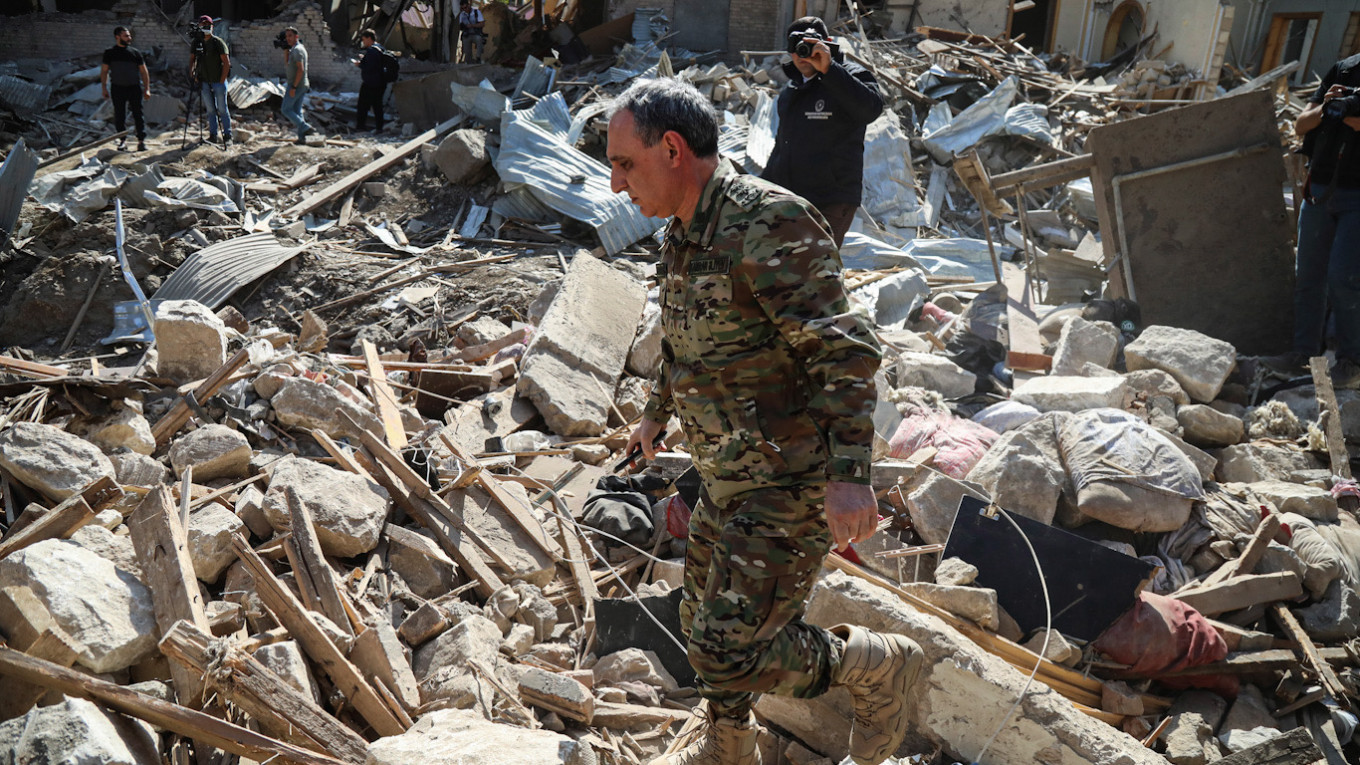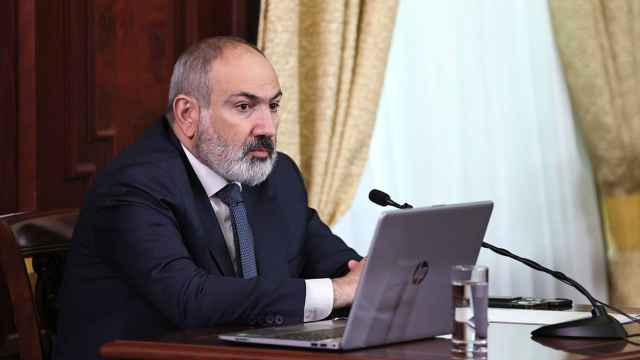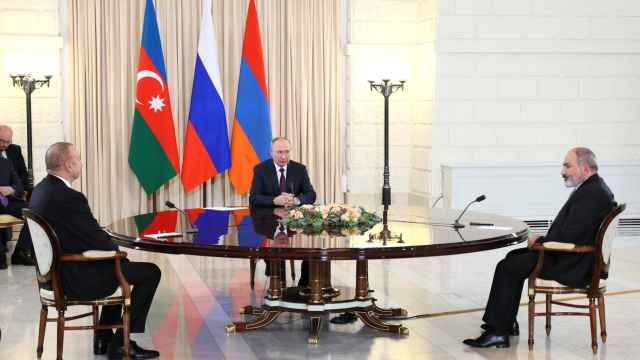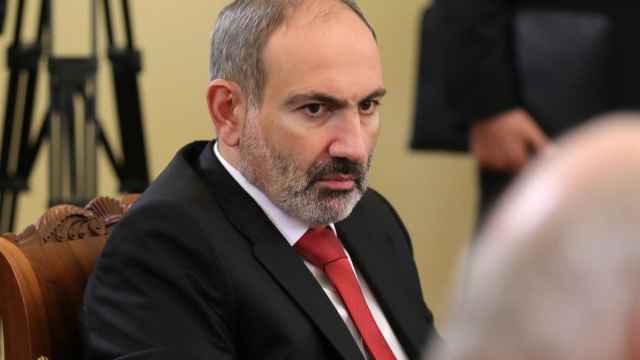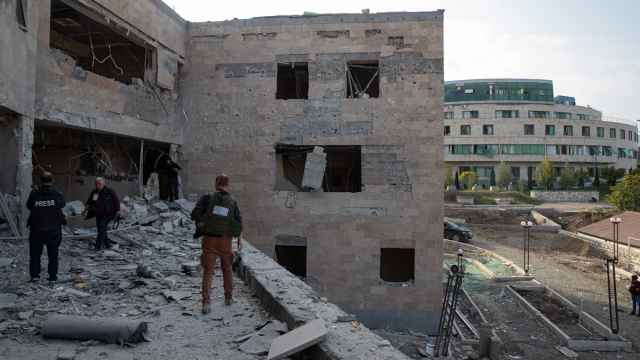Russian President Vladimir Putin said Thursday that weeks of fighting over the mountainous Nagorno-Karabakh province had left close to 5,000 people dead as world leaders scrambled to broker a truce.
The disputed region in Azerbaijan is controlled by Armenian separatists backed by Yerevan, who declared independence as the Soviet Union fell in a conflict that erupted again into full-scale fighting last month.
Armenian Prime Minister Nikol Pashinyan and Azerbaijan's President Ilham Aliyev have rebuffed calls for peace and fighters on the ground have left two ceasefires in tatters after accusing the other side of violations.
Putin said in a televised appearance Thursday that both sides had incurred losses nearing 2,000 people in fighting that has seen thousands of people displaced and both sides levy allegations of war crimes.
"The total number of deaths is already nearing 5,000," Putin said.
Armenian separatists and the Azerbaijani military claim to have inflicted devastating losses on the other side in terms of military hardware and military personnel.
Yet the confirmed death toll from the most recent outbreak of fighting that erupted on Sept. 27 is just under 1,000 including civilians — a figure that is believed to be much lower than the real human cost since Azerbaijan has not disclosed its military fatalities.
Exhausted diplomacy
Azerbaijan has repeatedly boasted of military gains after nearly a month of fighting and Pashinyan conceded this week his country was facing "a difficult situation" on the frontline.
Aliyev made the significant claim Thursday — denied by Armenia — that his military now had full control of the border with Iran.
"The state border between Azerbaijan and the Islamic Republic of Iran has been completely secured through liberation of the Agbend settlement," he said on Twitter.
Baku has never hidden its desire to regain full control over Karabakh and the seven regions, but analysts say it will struggle to achieve this by military means alone.
Yet diplomacy also appears exhausted for now, with Pashinyan ruling out any diplomatic solution to the conflict for the moment and Aliyev recently vowing to hunt down Armenian troops "like dogs."
The foreign minsters of Azerbaijan and Armenia are to meet separately with U.S. Secretary of State Mike Pompeo in Washington on Friday after the diplomats flew to Moscow for talks with their Russian counterpart, Sergei Lavrov, this week.
Putin said Thursday that he was in "constant" communication with Pashinyan and Aliyev to the point where he talks to them on the phone "several times a day."
'Calm tensions'
French President Emmanuel Macron on Thursday also spoke with both leaders and met with Armenian President Armen Sarkissian.
The search for a long-term solution to the conflict — one of the most enduring problems left after the fall of the Soviet Union — is in the hands of the Minsk Group of regional powers chaired by France, Russia and the U.S.
The group brokered a ceasefire in 1994, but lacked political clout to secure a lasting resolution to the simmering territorial dispute.
Pashinyan has said the Minsk group's roadmap for peace is now unacceptable and Azerbaijan says after nearly 30 years of impasse, its staunch ally and military sponsor Turkey should be given a seat at the negotiating table.
NATO chief Jens Stoltenberg said on Thursday he expected alliance member Turkey to use its influence to help head off further fighting and called for an immediate ceasefire.
"Turkey is a valued ally, but I also expect Turkey to use its considerable influence in the region to calm tensions."
In an interview with AFP, the head of an International Committee of the Red Cross (ICRC) mission monitoring the conflict urged all parties to stop shelling civilians.
"We insist that the sides to the conflict comply with international humanitarian law," Gerardo Moloeznik said.
A Message from The Moscow Times:
Dear readers,
We are facing unprecedented challenges. Russia's Prosecutor General's Office has designated The Moscow Times as an "undesirable" organization, criminalizing our work and putting our staff at risk of prosecution. This follows our earlier unjust labeling as a "foreign agent."
These actions are direct attempts to silence independent journalism in Russia. The authorities claim our work "discredits the decisions of the Russian leadership." We see things differently: we strive to provide accurate, unbiased reporting on Russia.
We, the journalists of The Moscow Times, refuse to be silenced. But to continue our work, we need your help.
Your support, no matter how small, makes a world of difference. If you can, please support us monthly starting from just $2. It's quick to set up, and every contribution makes a significant impact.
By supporting The Moscow Times, you're defending open, independent journalism in the face of repression. Thank you for standing with us.
Remind me later.


